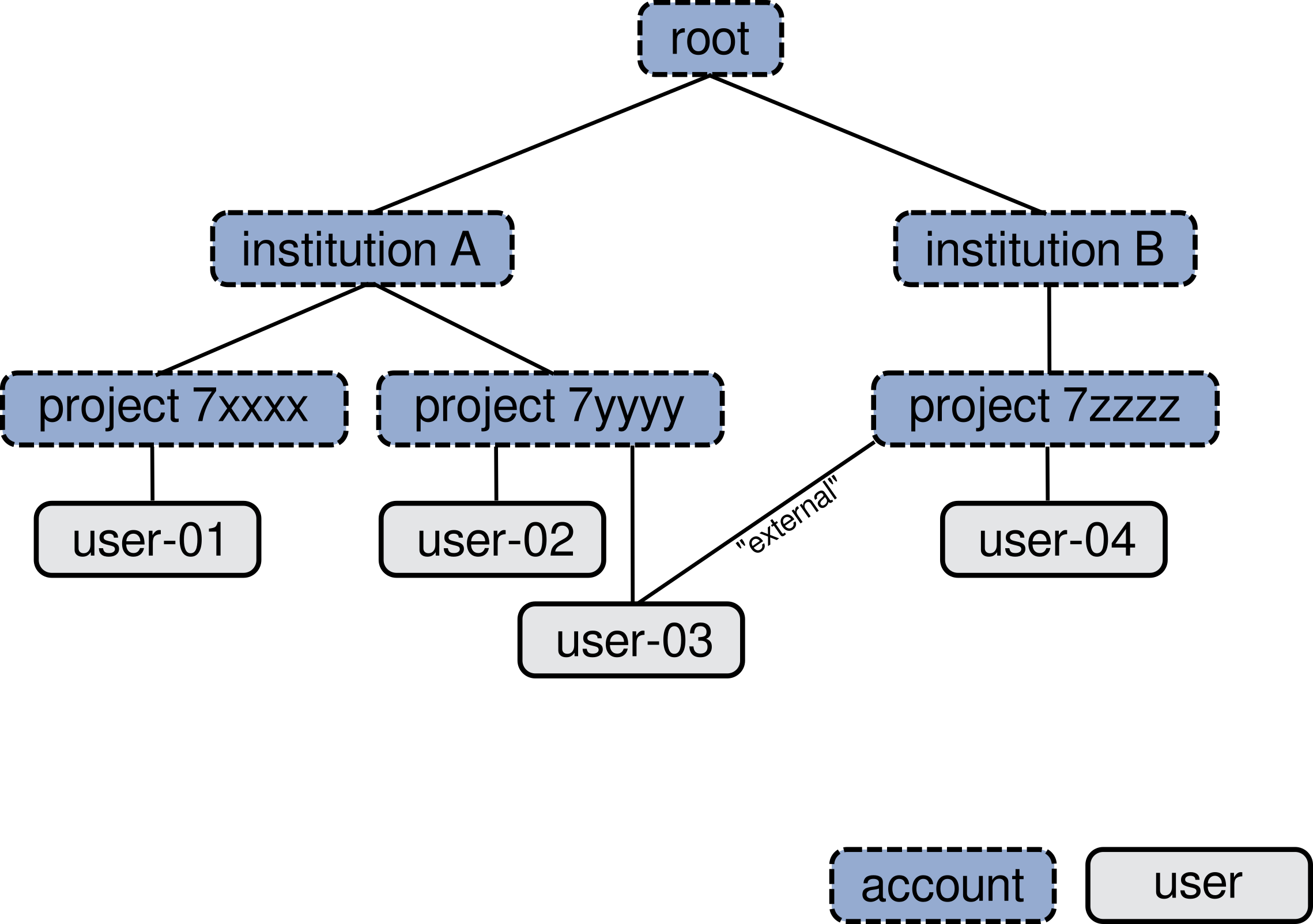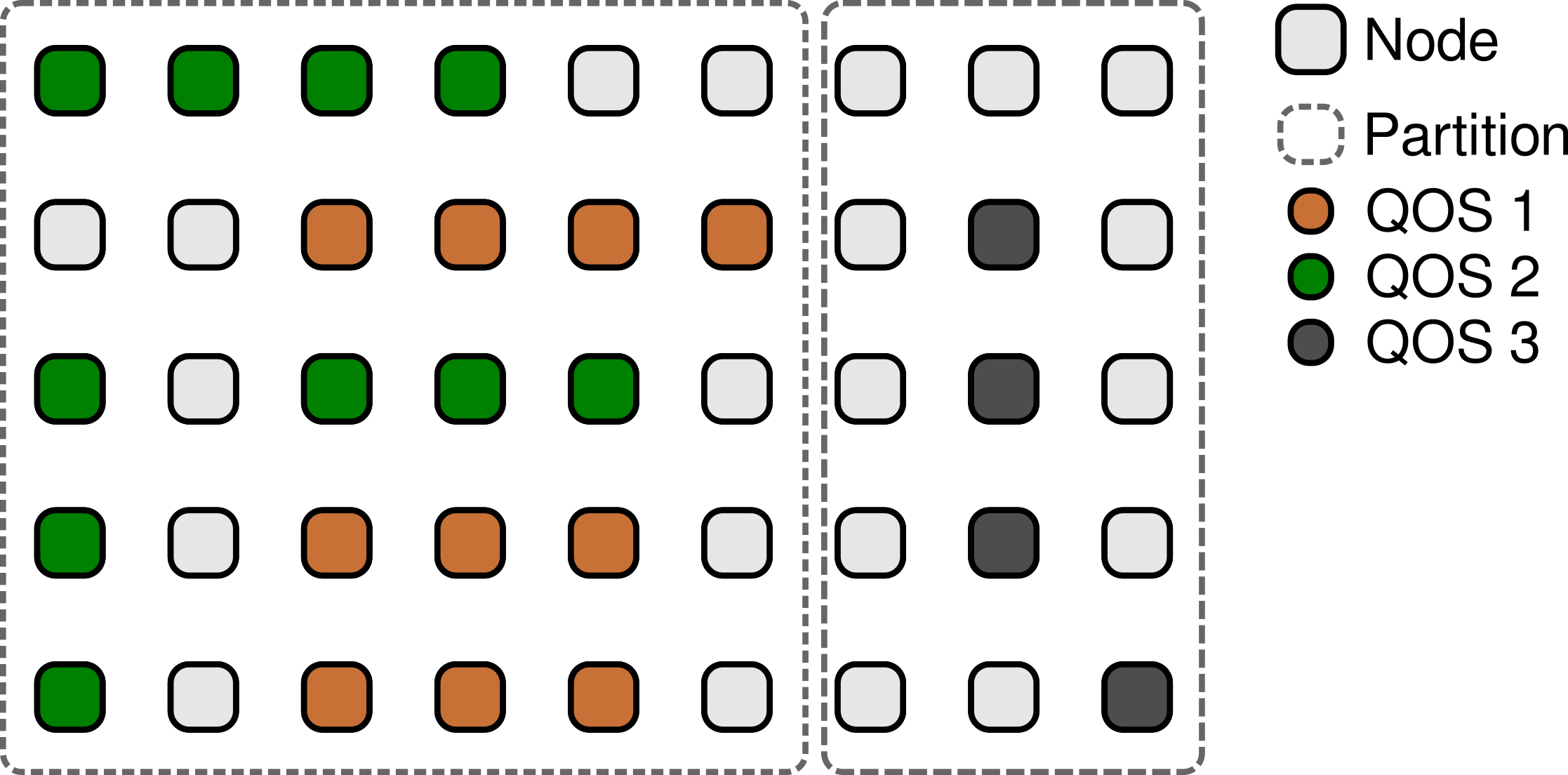 This version (2017/11/07 12:57) is a draft.
This version (2017/11/07 12:57) is a draft.Approvals: 0/1
This is an old revision of the document!
SLURM
- Article written by Markus Stöhr (VSC Team) <html><br></html>(last update 2017-10-09 by ms).
Quickstart
script examples/05_submitting_batch_jobs/job-quickstart.sh:
#!/bin/bash #SBATCH -J h5test #SBATCH -N 1 module purge module load gcc/5.3 intel-mpi/5 hdf5/1.8.18-MPI cp $VSC_HDF5_ROOT/share/hdf5_examples/c/ph5example.c . mpicc -lhdf5 ph5example.c -o ph5example mpirun -np 8 ./ph5example -c -v
submission:
sbatch job.sh
Submitted batch job 5250981
check what is going on:
squeue -u $USER
JOBID PARTITION NAME USER ST TIME NODES NODELIST(REASON) 5250981 mem_0128 h5test markus R 0:00 2 n23-[018-019]
Output files:
ParaEg0.h5 ParaEg1.h5 slurm-5250981.out
try on .h5 files:
h5dump
cancel jobs:
scancel <job_id>
or
scancel <job_name>
or
scancel -u $USER
Basic concepts
Queueing system
- job/batch script:
- shell script, that does everything needed to run your calculation
- independent of queueing system
- use simple scripts (max 50 lines, i.e. put complicated logic elsewhere)
- load modules from scratch (purge, then load)
- tell scheduler where/how to run jobs:
- #nodes
- nodetype
- …
- scheduler manages job allocation to compute nodes
SLURM: Accounts and Users
SLURM: Partition and Quality of Service
VSC-3 Hardware Types
| partition | memory | |
|---|---|---|
| mem_0064 | 64 GB | default |
| mem_0128 | 128 GB | |
| mem_0256 | 256 GB |
- All nodes with the same CPU configuration:
- 16 cores
- 2 x Intel(R) Xeon(R) CPU E5-2650 v2 @ 2.60GHz (Ivy-Bridge)
- Display information about partitions and their nodes:
sinfo -o %P scontrol show partition mem_0064 scontrol show node n01-001
QOS-Account/Project assignment
1.+2.:
sqos -acc
default_account: p70824
account: p70824
default_qos: normal_0064
qos: devel_0128
goodluck
gpu_compute
gpu_vis
knl
normal_0064
normal_0128
normal_0256
QOS-Partition assignment
3.:
sqos
qos_name total free walltime prio partitions
==========================================================
normal_0064 1796 43 3-00:00:00 2000 mem_0064
normal_0256 15 -1 3-00:00:00 2000 mem_0256
normal_0128 67 -3 3-00:00:00 2000 mem_0128
devel_0128 10 9 00:10:00 20000 mem_0128
gpu_compute 12 3 3-00:00:00 1000 p70971_gpu,gpu
gpu_vis 4 4 3-00:00:00 1000 p70971_gpu,gpu
goodluck 470 470 3-00:00:00 1000
knl 4 4 3-00:00:00 1000 knl
naming convention:
| QOS | Partition |
|---|---|
| *_0064 | mem_0064 |
Specification in job script
#SBATCH --account=xxxxxx #SBATCH --qos=xxxxx_xxxx #SBATCH --partition=mem_xxxx
For omitted lines corresponding defaults are used. See previous slides, default partition is “mem_0064”
Sample batch job
default:
#!/bin/bash #SBATCH -J jobname #SBATCH -N number_of_nodes do_my_work
job is submitted to:
- partition mem_0064
- qos normal_0064
- default account
explicit:
#!/bin/bash #SBATCH -J jobname #SBATCH -N number_of_nodes #SBATCH #SBATCH #SBATCH --partition=mem_xxxx #SBATCH --qos=xxxxx_xxxx #SBATCH --account=xxxxxx do_my_work
- must be a shell script (first line!)
- '#SBATCH' for marking SLURM parameters
- environment variables are set by SLURM for use within the script (e.g.
SLURM_JOB_NUM_NODES)
Job submission
sbatch <SLURM_PARAMETERS> job.sh <JOB_PARAMETERS>
- parameters are specified as in job script
- precedence: sbatch parameters override parameters in job script
- be careful to place slurm parameters before job script
Exercises
- try these commands and find out which partition has to be used if you want to run in QOS 'devel_0128':
sqos sqos -acc
- find out, which nodes are in the partition that allows running in 'devel_0128'. Further, check how much memory these nodes have:
scontrol show partition ... scontrol show node ...
- submit a one node job to QOS devel_0128 with the following commands:
hostname free
Bad job practices
- looped job submission (takes a long time):
for i in {1..1000}
do
sbatch job.sh $i
done
- loop in job (sequential mpirun commands):
for i in {1..1000}
do
mpirun my_program $i
done
Array job
- run similar, independent jobs at once, that can be distinguished by one parameter
- each task will be treated as a seperate job
- example (job_array.sh, sleep.sh), start=1, end=30, stepwidth=7:
#!/bin/sh #SBATCH -J array #SBATCH -N 1 #SBATCH --array=1-30:7 ./sleep.sh $SLURM_ARRAY_TASK_ID
- computed tasks: 1, 8, 15, 22, 29
5605039_[15-29] mem_0064 array markus PD 5605039_1 mem_0064 array markus R 5605039_8 mem_0064 array markus R
useful variables within job:
SLURM_ARRAY_JOB_ID SLURM_ARRAY_TASK_ID SLURM_ARRAY_TASK_STEP SLURM_ARRAY_TASK_MAX SLURM_ARRAY_TASK_MIN
limit number of simultanously running jobs to 2:
#SBATCH --array=1-30:7%2
Single core
- use a complete compute node for several tasks at once
- example: job_singlenode_manytasks.sh:
... max_num_tasks=16 ... for i in `seq $task_start $task_increment $task_end` do ./$executable $i & check_running_tasks #sleeps as long as max_num_tasks are running done wait
- '&': start binary in background, script can continue
- 'wait': waits for all processes in the background, otherwise script will finish
Array job + single core
...
#SBATCH --array=1-100:32
...
task_start=$SLURM_ARRAY_TASK_ID
task_end=$(( $SLURM_ARRAY_TASK_ID + $SLURM_ARRAY_TASK_STEP -1 ))
if [ $task_end -gt $SLURM_ARRAY_TASK_MAX ]; then
task_end=$SLURM_ARRAY_TASK_MAX
fi
task_increment=1
...
for i in `seq $task_start $task_increment $task_end`
do
./$executable $i &
check_running_tasks
done
wait
Exercises
- files are located in folder
examples/05_submitting_batch_jobs - download or copy sleep.sh and find out what it is doing
- run job_array.sh with tasks 4-20 and stepwidth 3
- start a jobs for job_singlenode_manytasks.sh with max_num_tasks=16 and max_num_tasks=8; compare the job runtimes
Job/process setup
- normal jobs:
| #SBATCH | job environment |
|---|---|
| -N | SLURM_JOB_NUM_NODES |
| –ntasks-per-core | SLURM_NTASKS_PER_CORE |
| –ntasks-per-node | SLURM_NTASKS_PER_NODE |
| –ntasks-per-socket | SLURM_NTASKS_PER_SOCKET |
| –ntasks, -n | SLURM_NTASKS |
- emails:
#SBATCH --mail-user=yourmail@example.com #SBATCH --mail-type=BEGIN,END
- constraints:
#SBATCH -C --constraint #SBATCH --gres= #SBATCH -t, --time=<time> #SBATCH --time-min=<time>
Valid time formats:
- MM
- [HH:]MM:SS
- DD-HH[:MM[:SS]]
- backfilling:
- specify '–time' or '–time-min' that is eligible for your job
- short runtimes may enable the scheduler to use idle nodes waiting for a large job
Licenses
slic
Within the job script add the flags as shown with 'slic', e.g. for using both Matlab and Mathematica:
#SBATCH -L matlab@vsc,mathematica@vsc
Intel licenses are needed only for compiling code, not for running it!
Reservations of compute nodes
- core-h accounting is done for the full reservation time
- contact us, if needed
- reservations are named after the project id
- check for reservations:
scontrol show reservations
- use it:
#SBATCH --reservation=
Exercises
- check for available reservations. If there is one available, use it
- specify an email address that notifies you when the job has finished
- run the following matlab code in your job:
echo "2+2" | matlab
MPI + NTASKS_PER_NODE + pinning
- understand what your code is doing and place the processes correctly
- use only a few processes per node if memory demand is high
- details for pinning: https://wiki.vsc.ac.at/doku.php?id=doku:vsc3_pinning
Example: Two nodes with two mpi processes each:
srun
#SBATCH -N 2 #SBATCH --tasks-per-node=2 srun --cpu_bind=map_cpu:0,8 ./my_mpi_program
mpirun
#SBATCH -N 2 #SBATCH --tasks-per-node=2 export I_MPI_PIN_PROCESSOR_LIST=0,8 mpirun ./my_mpi_program
Job dependencies
- Submit first job and get its <job id>
- Submit dependent job (and get <job_id>):
#!/bin/bash #SBATCH -J jobname #SBATCH -N 2 #SBATCH -d afterany:<job_id> srun ./my_program
<HTML><ol start=“3” style=“list-style-type: decimal;”></HTML> <HTML><li></HTML>continue at 2. for further dependent jobs<HTML></li></HTML><HTML></ol></HTML>




